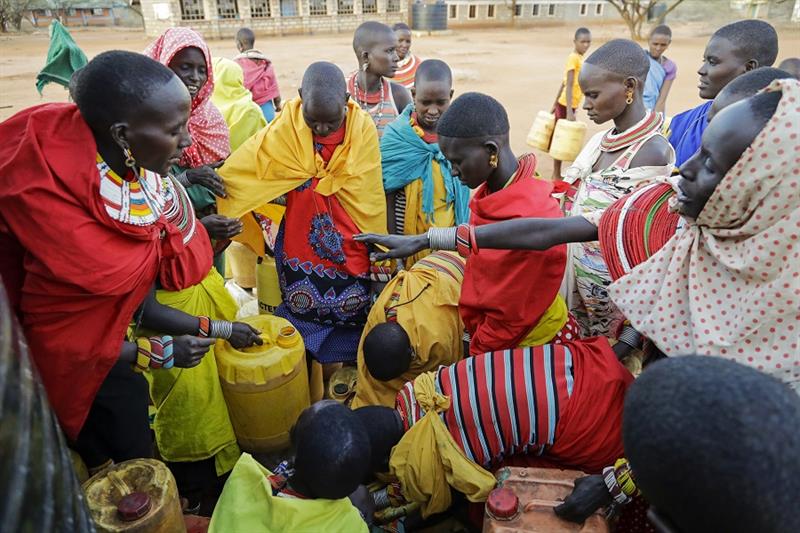
File Photo: Samburu women fetch water in Loolkuniyani Primary School, Samburu County, Kenya on Sunday, Oct. 16, 2022. AP
The initiative African Women’s and Climate Change Adaptation (AWCAP) was launched during the Women’s Day activities at the COP27.
The initiative was launched in cooperation with the United Nations Entity for Gender Equality and the Empowerment of Women (UN-Women).
Maya Morsy, president of the National Council for Women (NCW), explained that the initiative provides Africa with the opportunity to achieve the goals of the United Nations Framework Convention on Climate Change via women’s empowerment.
This is in order to achieve synergy with existing mechanisms and platforms that support women. It is also geared to design Africa-specific interventions to support women of the continent as active actors — like men — in equitable transition.
African women make up more than 50 per cent of the continent’s population and are heavily reliant on environment-related livelihoods working in disproportionately climate-exposed sectors such as health, agriculture, livestock management, forestry and water management.
Rural African women are at a significant risk of being adversely affected by climate change due to increased agricultural work and displacement resulting from climate impact.
In the wake of disasters, women and children are 80 per cent of those needing assistance while poor women are 14 times more likely to die during a natural disaster. Climate change exacerbates the disadvantages that women face in their daily lives.
The World Economic Forum (WEF) estimates that it will take roughly 135 years to close the global gender gap. To design and implement effective adaptation strategies, it is imperative to capitalise on the win-win situation of bringing women into climate action.
The wealth of knowledge in managing natural resources that African women have cumulatively attained is essential for implementing effective adaptation policies, according to the WEF.
Almost 40 per cent of the agricultural workforce in 46 out of 53 African countries are women. Seventy per cent of the continent’s food is produced by women even though they represent just 15 per cent of landholders. African women in local agriculture are also well-versed in climate-sensitive cropping, seed selection and storage, preparation of biofertilisers, pest management, and post-harvest processing and value addition.
A resilient water-energy-food transition has the potential to provide significant socioeconomic advantages to African countries where the solution to climate change’s problems is green energy coupled with climate proofing water and food systems and infrastructure.
Equipping and employing African women in clean energy and adaptation in water and agriculture are the major factors in meeting global crises. However, the typical barriers for women, such as access to education and limited economic opportunities especially within the green sector due to norms and misconceptions, are preventing women from taking part in the transition.
Existing inequalities facing women and girls limit sustainable and equitable transition to resilient water-energy-food systems especially in the most climate change prone areas. Such inequalities and barriers facing African women imply by definition that they are the strategic actors to reliable and effective fair transition to the sustainable development agenda.
Accordingly, the AWCAP’s biggest objectives are increasing cooperation among African member states by creating a nexus that includes women ministers and relevant environment ministers.
This would take place by bringing together joint focus on the topics of women within adaptation and mitigation in water, energy and agriculture sectors. It will also help in highlighting successful women role models and their leadership in those sectors, thus encouraging member states to include more women in the decision-making process.
This is in addition to strengthening commitments for investing in women by increasing investments in capacity-building programmes to support women in different fields, starting by education all the way to the labour market, enhancing women’s access to financial support and building their capacities to prepare investable climate projects.
This is essential, according to one initiative to capitalise on existing public-private-partnerships. It would be accomplished by promoting institutional transformation models within private sector companies working in relevant fields to ensure gender equality and women’s empowerment.
*A version of this article appears in print in the 17 November, 2022 edition of Al-Ahram Weekly.
Short link: